
Question Number 120409 by SOMEDAVONG last updated on 31/Oct/20
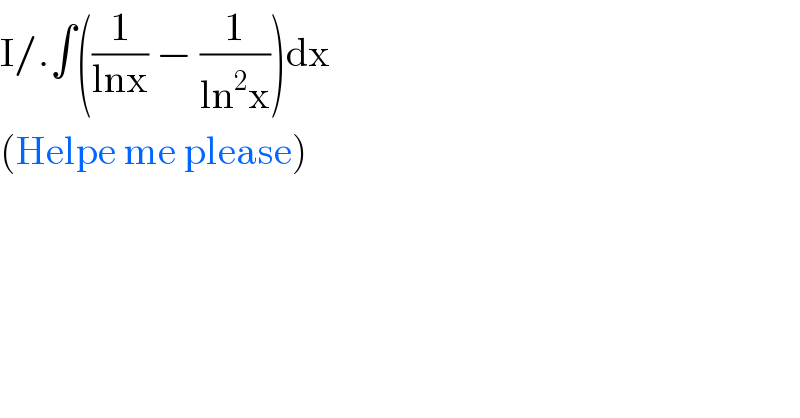
$$\mathrm{I}/.\int\left(\frac{\mathrm{1}}{\mathrm{lnx}}\:−\:\frac{\mathrm{1}}{\mathrm{ln}^{\mathrm{2}} \mathrm{x}}\right)\mathrm{dx} \\ $$$$\left(\mathrm{Helpe}\:\mathrm{me}\:\mathrm{please}\right) \\ $$
Commented by soumyasaha last updated on 31/Oct/20
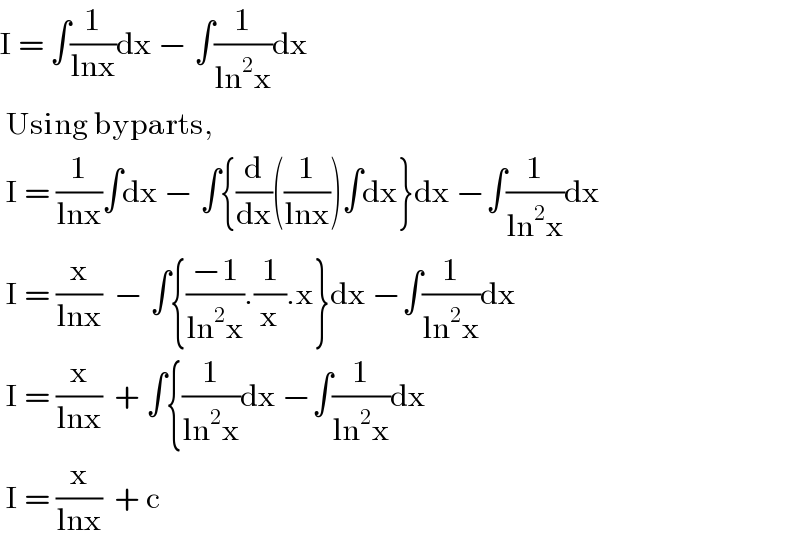
$$\mathrm{I}\:=\:\int\frac{\mathrm{1}}{\mathrm{lnx}}\mathrm{dx}\:−\:\int\frac{\mathrm{1}}{\mathrm{ln}^{\mathrm{2}} \mathrm{x}}\mathrm{dx} \\ $$$$\:\mathrm{Using}\:\mathrm{byparts},\: \\ $$$$\:\mathrm{I}\:=\:\frac{\mathrm{1}}{\mathrm{lnx}}\int\mathrm{dx}\:−\:\int\left\{\frac{\mathrm{d}}{\mathrm{dx}}\left(\frac{\mathrm{1}}{\mathrm{lnx}}\right)\int\mathrm{dx}\right\}\mathrm{dx}\:−\int\frac{\mathrm{1}}{\mathrm{ln}^{\mathrm{2}} \mathrm{x}}\mathrm{dx} \\ $$$$\:\mathrm{I}\:=\:\frac{\mathrm{x}}{\mathrm{lnx}}\:\:−\:\int\left\{\frac{−\mathrm{1}}{\mathrm{ln}^{\mathrm{2}} \mathrm{x}}.\frac{\mathrm{1}}{\mathrm{x}}.\mathrm{x}\right\}\mathrm{dx}\:−\int\frac{\mathrm{1}}{\mathrm{ln}^{\mathrm{2}} \mathrm{x}}\mathrm{dx} \\ $$$$\:\mathrm{I}\:=\:\frac{\mathrm{x}}{\mathrm{lnx}}\:\:+\:\int\left\{\frac{\mathrm{1}}{\mathrm{ln}^{\mathrm{2}} \mathrm{x}}\mathrm{dx}\:−\int\frac{\mathrm{1}}{\mathrm{ln}^{\mathrm{2}} \mathrm{x}}\mathrm{dx}\right. \\ $$$$\:\mathrm{I}\:=\:\frac{\mathrm{x}}{\mathrm{lnx}}\:\:+\:\mathrm{c} \\ $$
Answered by Lordose last updated on 31/Oct/20
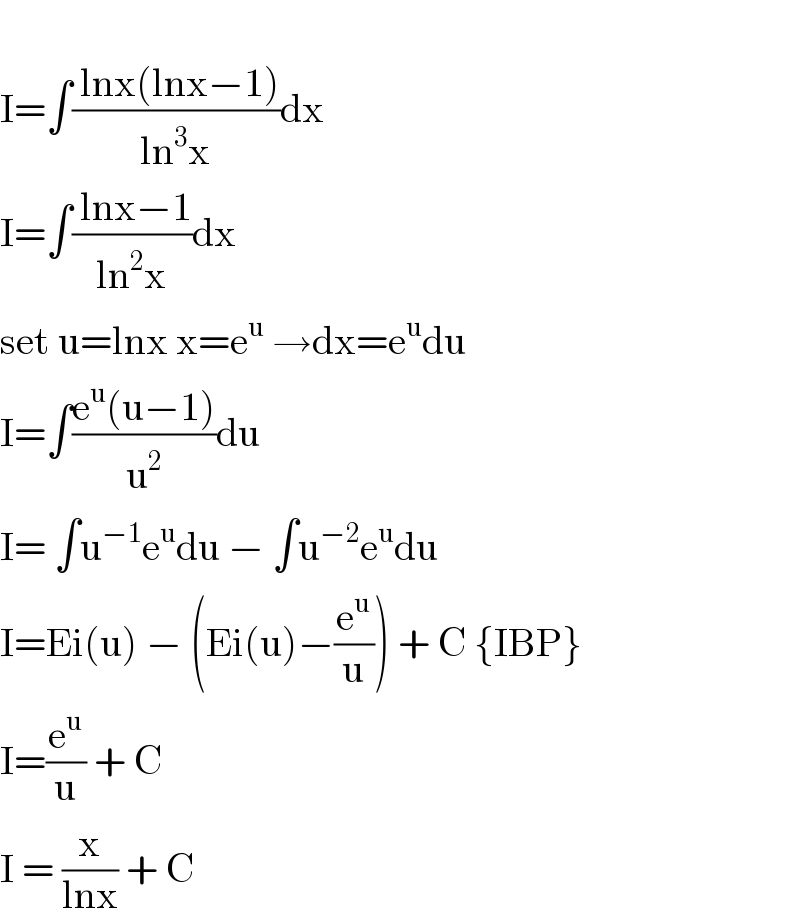
$$ \\ $$$$\mathrm{I}=\int\frac{\:\mathrm{lnx}\left(\mathrm{lnx}−\mathrm{1}\right)}{\mathrm{ln}^{\mathrm{3}} \mathrm{x}}\mathrm{dx} \\ $$$$\mathrm{I}=\int\frac{\:\mathrm{lnx}−\mathrm{1}}{\mathrm{ln}^{\mathrm{2}} \mathrm{x}}\mathrm{dx} \\ $$$$\mathrm{set}\:\mathrm{u}=\mathrm{lnx}\:\mathrm{x}=\mathrm{e}^{\mathrm{u}} \:\rightarrow\mathrm{dx}=\mathrm{e}^{\mathrm{u}} \mathrm{du} \\ $$$$\mathrm{I}=\int\frac{\mathrm{e}^{\mathrm{u}} \left(\mathrm{u}−\mathrm{1}\right)}{\mathrm{u}^{\mathrm{2}} }\mathrm{du} \\ $$$$\mathrm{I}=\:\int\mathrm{u}^{−\mathrm{1}} \mathrm{e}^{\mathrm{u}} \mathrm{du}\:−\:\int\mathrm{u}^{−\mathrm{2}} \mathrm{e}^{\mathrm{u}} \mathrm{du} \\ $$$$\mathrm{I}=\mathrm{Ei}\left(\mathrm{u}\right)\:−\:\left(\mathrm{Ei}\left(\mathrm{u}\right)−\frac{\mathrm{e}^{\mathrm{u}} }{\mathrm{u}}\right)\:+\:\mathrm{C}\:\left\{\mathrm{IBP}\right\} \\ $$$$\mathrm{I}=\frac{\mathrm{e}^{\mathrm{u}} }{\mathrm{u}}\:+\:\mathrm{C} \\ $$$$\mathrm{I}\:=\:\frac{\mathrm{x}}{\mathrm{lnx}}\:+\:\mathrm{C} \\ $$
Commented by SOMEDAVONG last updated on 31/Oct/20

$$\left(\mathrm{Thank}\:\mathrm{you}\:\mathrm{so}\:\mathrm{much}\right) \\ $$
Answered by TANMAY PANACEA last updated on 31/Oct/20
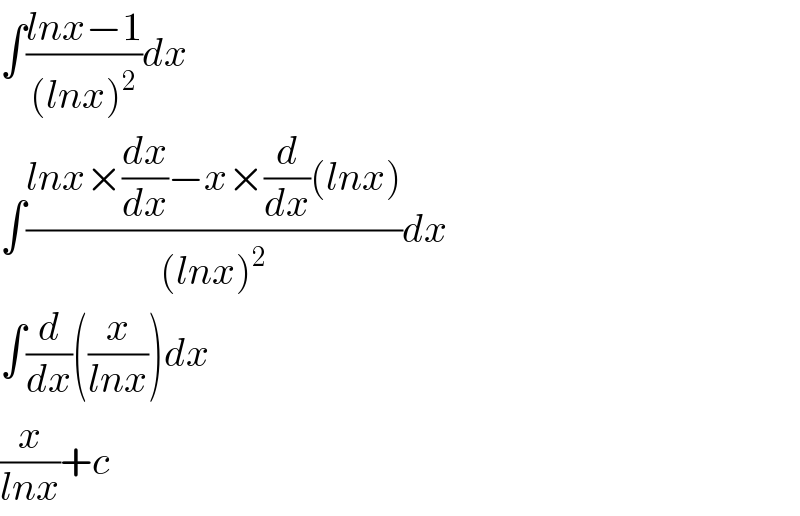
$$\int\frac{{lnx}−\mathrm{1}}{\left({lnx}\right)^{\mathrm{2}} }{dx} \\ $$$$\int\frac{{lnx}×\frac{{dx}}{{dx}}−{x}×\frac{{d}}{{dx}}\left({lnx}\right)}{\left({lnx}\right)^{\mathrm{2}} }{dx} \\ $$$$\int\frac{{d}}{{dx}}\left(\frac{{x}}{{lnx}}\right){dx} \\ $$$$\frac{{x}}{{lnx}}+{c} \\ $$
Commented by mnjuly1970 last updated on 31/Oct/20

$${very}\:{nice}\:{solution}\: \\ $$$${sir}\:\:{tanmay}\:.{thank}\:{you}... \\ $$
Commented by TANMAY PANACEA last updated on 31/Oct/20

$${most}\:{welcome}\:{sir} \\ $$
Answered by mathmax by abdo last updated on 31/Oct/20
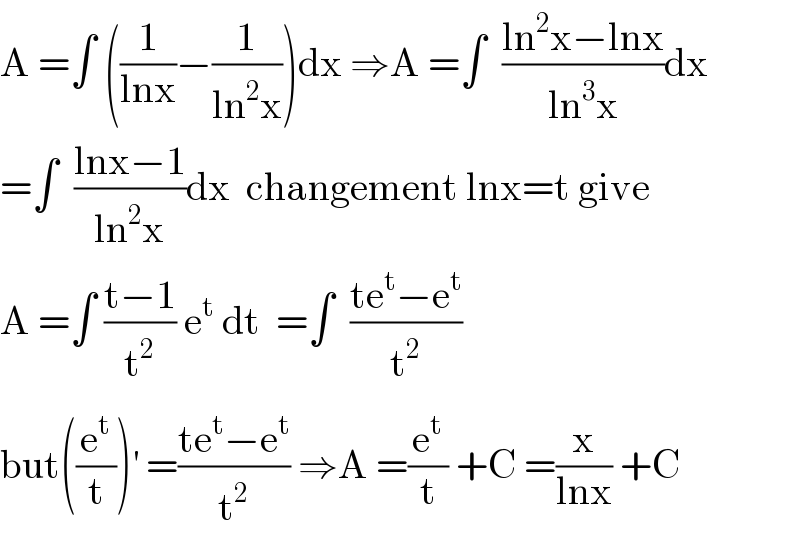
$$\mathrm{A}\:=\int\:\left(\frac{\mathrm{1}}{\mathrm{lnx}}−\frac{\mathrm{1}}{\mathrm{ln}^{\mathrm{2}} \mathrm{x}}\right)\mathrm{dx}\:\Rightarrow\mathrm{A}\:=\int\:\:\frac{\mathrm{ln}^{\mathrm{2}} \mathrm{x}−\mathrm{lnx}}{\mathrm{ln}^{\mathrm{3}} \mathrm{x}}\mathrm{dx} \\ $$$$=\int\:\:\frac{\mathrm{lnx}−\mathrm{1}}{\mathrm{ln}^{\mathrm{2}} \mathrm{x}}\mathrm{dx}\:\:\mathrm{changement}\:\mathrm{lnx}=\mathrm{t}\:\mathrm{give} \\ $$$$\mathrm{A}\:=\int\:\frac{\mathrm{t}−\mathrm{1}}{\mathrm{t}^{\mathrm{2}} }\:\mathrm{e}^{\mathrm{t}} \:\mathrm{dt}\:\:=\int\:\:\frac{\mathrm{te}^{\mathrm{t}} −\mathrm{e}^{\mathrm{t}} }{\mathrm{t}^{\mathrm{2}} } \\ $$$$\mathrm{but}\left(\frac{\mathrm{e}^{\mathrm{t}} }{\mathrm{t}}\right)^{'} \:=\frac{\mathrm{te}^{\mathrm{t}} −\mathrm{e}^{\mathrm{t}} }{\mathrm{t}^{\mathrm{2}} }\:\Rightarrow\mathrm{A}\:=\frac{\mathrm{e}^{\mathrm{t}} }{\mathrm{t}}\:+\mathrm{C}\:=\frac{\mathrm{x}}{\mathrm{lnx}}\:+\mathrm{C} \\ $$
